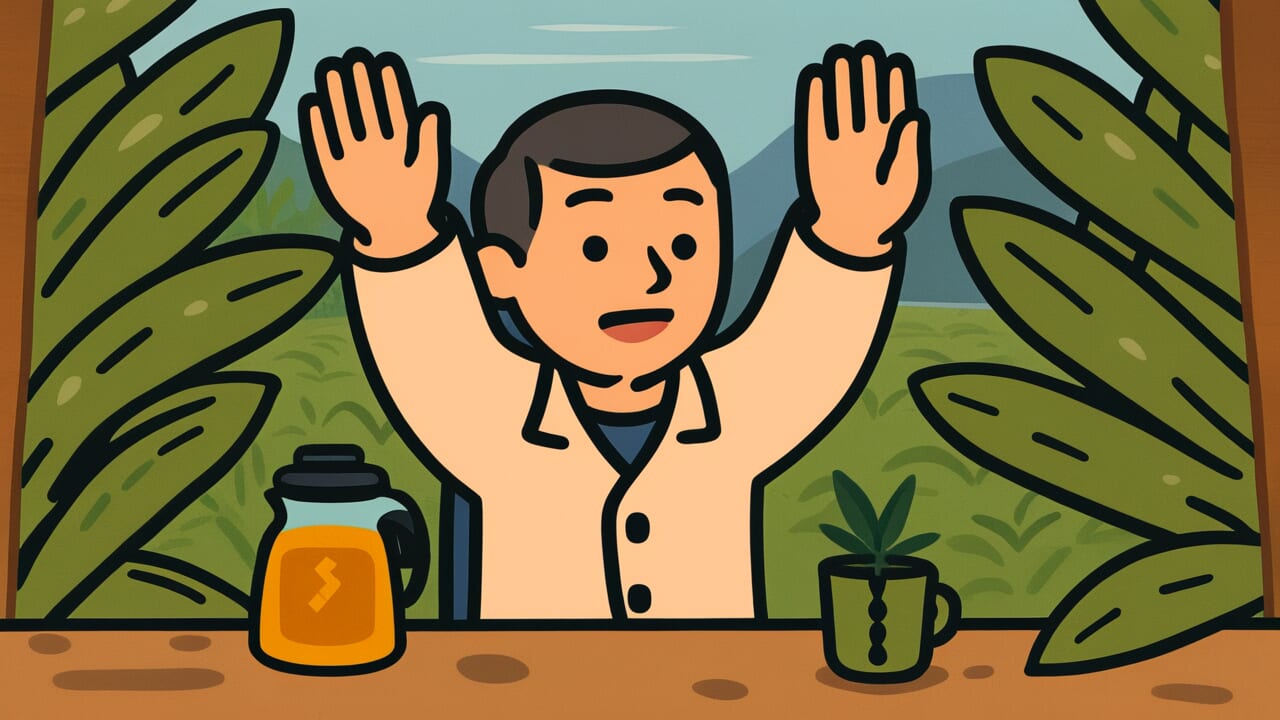How to Read “Seeking three-year-old moxa for a seven-year illness”
Shichinen no yamai ni sannen no mogusa wo motomu
Meaning of “Seeking three-year-old moxa for a seven-year illness”
“Seeking three-year-old moxa for a seven-year illness” means it’s too late to look for solutions when a problem becomes serious after years of neglect.
This proverb applies when someone ignores a problem and keeps putting it off. Eventually, the situation becomes irreversible.
Imagine someone who has been sick for seven years without seeking treatment. Finally, they decide to find good medicine. But by then, the illness has become so serious that even the best remedy won’t work.
Today, this lesson applies to many areas beyond health. It covers relationships, work skills, and financial management.
The proverb teaches the importance of taking action early when you first notice warning signs. It warns against the “I’ll do it someday” attitude.
Origin and Etymology
The exact origin of this proverb isn’t clearly documented. However, its components reveal an interesting background.
“Moxa” refers to dried mugwort leaves used in moxibustion therapy. This treatment has been widely practiced in Japan and China since ancient times.
For chronic illnesses, people believed high-quality moxa was essential for proper treatment.
The phrase “three-year-old moxa” is particularly significant. Moxa aged for three years or more was considered the highest grade.
Long aging made the fibers finer. This created gentler, more effective heat during burning. So “three-year-old moxa” meant premium quality, not just quantity.
Someone sick for seven years finally decides to seek treatment. They want the best moxa available. But you can’t get it immediately when you rush to find it.
They should have prepared it when the illness first started. This contrast highlights the proverb’s lesson beautifully.
Medical wisdom and a warning about human procrastination merge perfectly in this expression.
Interesting Facts
Mugwort, used to make moxa, has long been cherished in Japan as “the herb that stops illness.” The character 艾 itself means “to stop.”
This reflects the hope that it would stop disease progression.
Edo period medical texts describe moxa quality in detail. Three-year, five-year, and seven-year aged moxa increased in value with aging time.
The highest grades were extremely expensive. Common people couldn’t afford them.
Usage Examples
- You ignored retest warnings for five years. Now you need hospitalization and suddenly search for top doctors. That’s like seeking three-year-old moxa for a seven-year illness.
- The company’s performance has declined for years. Trying to reform management now is like seeking three-year-old moxa for a seven-year illness.
Universal Wisdom
“Seeking three-year-old moxa for a seven-year illness” sharply points out a fundamental human weakness. We tend to look away from reality.
Why do people neglect problems? Because facing them is scary.
You suspect illness but avoid the doctor because you fear the diagnosis. You notice relationship cracks but don’t talk because you fear conflict.
This proverb comes from deep insight into human psychology.
What’s more interesting is how people suddenly seek “perfect solutions” after problems become serious.
After seven years of neglect, they suddenly want “the finest three-year-old moxa.” This contradictory behavior pattern is very human.
There’s panic to make up for years of laziness. There’s sweet hope that “everything will work out with the right thing.”
Our ancestors understood this human nature. Problems grow more complex and deep-rooted over time.
What could have been handled with small early action requires huge costs after neglect. They expressed this universal truth through a familiar medical example.
Times change, but this human weakness doesn’t. That’s why this proverb still resonates with us today.
When AI Hears This
Complex systems science reveals something surprising. As systems approach critical states, recovery time increases dramatically. This is called “critical slowing down.”
Let’s look at specific numbers. Say healthy status is 100 and the critical illness point is 0.
Recovering from 90 to 100 might take one week. But recovering from 70 to 80 takes one month. From 50 to 60 takes six months.
The worse things get, the more time you need to recover the same 10 points. It doubles each time.
Here we see the frightening truth of this proverb. Someone who neglected illness for seven years spending three years finding medicine is mathematically inevitable.
As systems approach critical points, they lose resilience. Then the ability to find effective treatment declines. Judgment ability also drops.
The longer the illness continues, the more time treatment preparation takes. This is the equation of a vicious cycle.
Ecosystem research confirms the same pattern. When forest destruction reaches 70 percent, recovery requires ten times longer than the original time.
Corporate management crises follow the same pattern. That’s why taking action while you still have margin is the absolute law that complex systems science teaches.
Lessons for Today
This proverb teaches modern people “the courage not to ignore small discomforts.”
Our daily lives contain countless small signs. Physical discomfort, awkward relationships, small mistakes at work, slight household budget disorder.
These seem like things where “it’s still okay.” But this proverb teaches us differently. Today’s small problem is the seed of tomorrow’s big crisis.
What matters isn’t waiting for perfect solutions. It’s taking small steps you can do today.
Schedule a health checkup. Talk to someone you’re concerned about. Clean just one corner of your messy room.
Such trivial actions prevent big future troubles.
Modern society is busy. We easily say “later” and postpone things. But remember this: problems don’t wait.
They worsen quietly but surely over time. Today is the youngest day in your life. Today is the day when problems are smallest.
When you notice small discomfort, that’s your chance to act. It becomes the best gift to your future self.



Comments